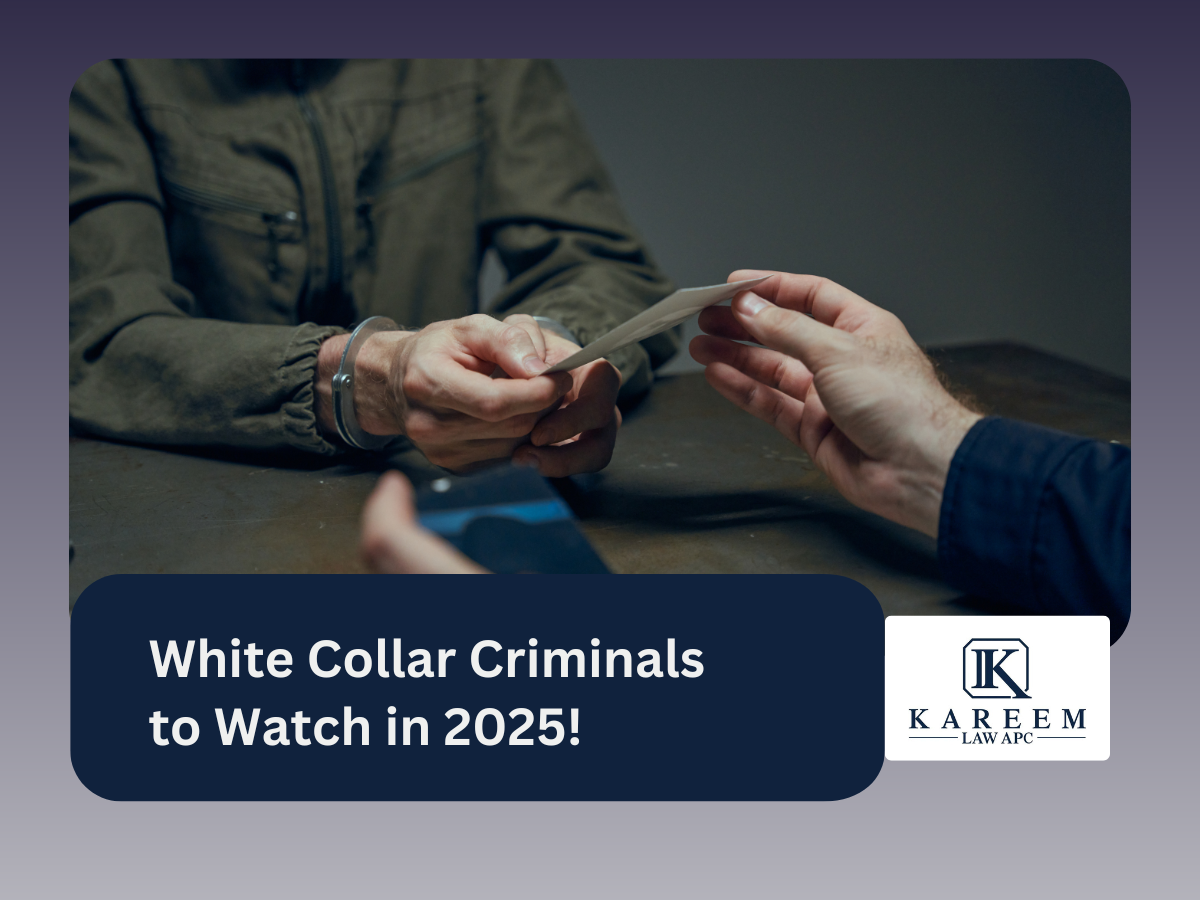White-collar crime is no more limited to bosses cutting costs or accountants fudging figures. By 2025, it will be high-tech fraud, worldwide money laundering, and digital global deceit. Thanks to worldwide connectivity and fast technological development, thieves today have fresh tools and approaches for committing major fraud. Innovation runs ahead, and so do chances for profit. Our white collar crime lawyers investigate some of the most well-known white collar criminals of 2025—people who made headlines—in this blog post together with what has happened to them since their cases startled the globe.
The Faces Behind the Headlines
These individuals once held positions of power, influence, and public trust—until their high-stakes schemes unraveled. Here’s a closer look at the most infamous white collar criminals of 2025 and what’s happened to them since.
- The Fall of a Crypto Head of State: Once heralded as the future of finance, the CEO of a big bitcoin exchange was sacked following the collapse of a $2 billion Ponzi scam following public disclosure of whistleblowers. Maintaining its illusion, the program depended on falsified records, false returns, and celebrity sponsorships. Many of the investors had placed life savings into the platform, therefore leaving them disappointed. Currently serving a 25-year federal term in a high-security facility is the executive. Originally a keynote speaker at international financial conferences, he is now the focus of documentaries and white collar criminals justice podcasts; his rise and fall serves as a warning story in the crypto space.
- Tech Sector Startup Fraud: Originally highlighted on Forbes’ “30 Under 30,” a financial business founder was caught falsifying investor documentation and exaggerating user stats in order to raise money. With prominent venture capital companies allegedly scammed of more than $500 million, the activities of the founder rocked Silicon Valley. Following a well-publicized trial, her term in federal prison was 15 years. Her narrative has generated discussions on due care and the pressure to scale rapidly in the startup scene. Former investors trying to recoup losses are now suing her many times civally.
- Political Integrity and Foreign Influence: Convicted of directing illicit foreign donations into many congressional elections, a well-known political lobbyist and former campaign advisor was The convoluted plan included strategic misdirection, bogus contributors, and offshore accounts. Following an eight-year sentence, the case generated national discussion and motivated proposed white collar crime laws meant to tighten rules on political lobbying and campaign money. Now advocating even more drastic changes to uphold the integrity of American elections are advocacy groups.
- Corporate Embezzlement on Grand Scale: Over seven years, the CFO of a national retail chain surreptitiously skimmed over $300 million via fictitious vendor accounts. To hide the money, she spun a complex web of shell businesses using forged invoices. Currently serving a 20-year sentence, her story is taught in business colleges as a textbook example of how internal controls could fail—even in the most well-known companies. Many businesses have been prompted by the case to review their audit procedures and put more strong financial controls into place.
- Using artificial intelligence to cross the line in trading: Using modern artificial intelligence techniques, an investment analyst mined and acted upon private market data, therefore automating insider trading. Although artificial intelligence has transformed financial analytics, this case underlined the moral and legal hazards connected with unbridled algorithmic power. Currently serving a ten-year sentence, his activities are considered a precedent-setting incident in control of artificial intelligence use in financial markets. Since then, regulatory agencies and industry watchdogs have tightened guidelines and raised monitoring on algorithmic trading and data security.
- Profiting from the Pandemic: Convicted of stealing over $120 million in pandemic relief money, the director of a nonprofit was white collar criminals. These money meant for underprivileged areas battling COVID-19 and small companies were meant for rather, the director poured the money into private aircraft, offshore accounts, and expensive homes. Following a 15-year sentence, the scandal spurred national changes in the way emergency money is allocated and tracked. Furthermore strengthened are transparency standards for non-profit organizations.
- The Crackdown on Offshore Tax Havens: Rich hedge fund manager engaged in worldwide offshore tax evasion ring currently awaiting extradition from a nation with limited cooperation accords. His name came up in a huge financial document dump revealing hundreds of shell businesses meant to conceal billions of dollars from tax authorities. Notwithstanding continuous research, the case emphasizes the challenges in punishing international financial crimes when cross-border collaboration and extradition are few.
What are The Cases Expose Regarding White-Collar Crime by 2025?
These tales show how white collar defense is changing in sophistication and scope. It is also becoming more prevalent. The white collar criminals engaged were educated professionals in positions of authority and trust, not desperate burglars. Their acts destroyed public confidence, upset markets, and resulted in enormous financial losses. This increasing risk emphasizes the need for more thorough corporate control, sophisticated fraud detection, and flexible legal systems equipped to match new technologies. Here are the cases Expose Regarding White Collar Crimes by 2025:
- Legislators and officials responding are giving:
- Digital asset rules
- AI policy in the financial sector
- Projects against money laundering
Although there is a more aggressive approach to research and enforcement now, others contend that fines still fall short for the damage done.
Where are The Top White Collar Criminals currently?
Though most of these people are behind jail right now, others are working to change their public perception. A handful have written memoirs, taken part in jailhouse interviews, or even advised on ethics and compliance—sometimes from inside prison walls. Still, the public is rather dubious, particularly among those who suffered personally from the crimes.
The argument of rehabilitation vs punishment gets louder yet. Should white-collared offenders be given second opportunities following their term? Alternatively, should their professional rights be permanently denied? True justice for many victims entails not just incarceration but also restitution and lifetime ban from positions of influence.
Conclusion
The well-known white collar criminals of 2025 remind us that fraud ruins lives, companies, and public confidence, not only figures on a spreadsheet. Technology blurs ethical boundaries and generates new tools for exploitation; society has to react with equal complexity in monitoring and responsibility.
Take this as a major warning whether you run a company, invest money, or work in finance. Review your compliance initiatives, know your partners, and apply robust financial controls. See legal counsel right away if you believe your company is engaged in fraud or misconduct. At Kareem Law APC, we represent the best attorneys for white collar criminals who have handled a wide range of white collar crime cases. Get in touch with us today at (888) 506-6519!









